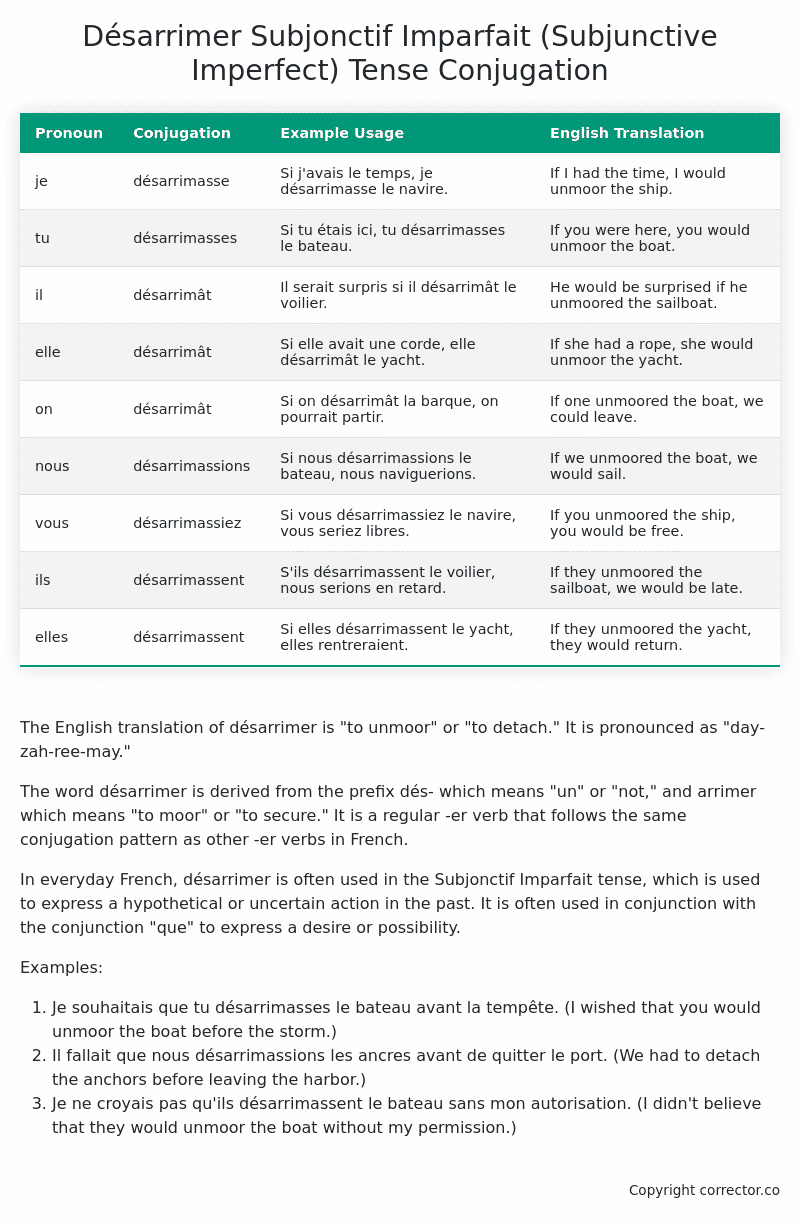Subjonctif Imparfait (Subjunctive Imperfect) Tense Conjugation of the French Verb désarrimer
Introduction to the verb désarrimer
The English translation of désarrimer is “to unmoor” or “to detach.” It is pronounced as “day-zah-ree-may.”
The word désarrimer is derived from the prefix dés- which means “un” or “not,” and arrimer which means “to moor” or “to secure.” It is a regular -er verb that follows the same conjugation pattern as other -er verbs in French.
In everyday French, désarrimer is often used in the Subjonctif Imparfait tense, which is used to express a hypothetical or uncertain action in the past. It is often used in conjunction with the conjunction “que” to express a desire or possibility.
Examples:
- Je souhaitais que tu désarrimasses le bateau avant la tempête. (I wished that you would unmoor the boat before the storm.)
- Il fallait que nous désarrimassions les ancres avant de quitter le port. (We had to detach the anchors before leaving the harbor.)
- Je ne croyais pas qu’ils désarrimassent le bateau sans mon autorisation. (I didn’t believe that they would unmoor the boat without my permission.)
Table of the Subjonctif Imparfait (Subjunctive Imperfect) Tense Conjugation of désarrimer
| Pronoun | Conjugation | Example Usage | English Translation |
|---|---|---|---|
| je | désarrimasse | Si j’avais le temps, je désarrimasse le navire. | If I had the time, I would unmoor the ship. |
| tu | désarrimasses | Si tu étais ici, tu désarrimasses le bateau. | If you were here, you would unmoor the boat. |
| il | désarrimât | Il serait surpris si il désarrimât le voilier. | He would be surprised if he unmoored the sailboat. |
| elle | désarrimât | Si elle avait une corde, elle désarrimât le yacht. | If she had a rope, she would unmoor the yacht. |
| on | désarrimât | Si on désarrimât la barque, on pourrait partir. | If one unmoored the boat, we could leave. |
| nous | désarrimassions | Si nous désarrimassions le bateau, nous naviguerions. | If we unmoored the boat, we would sail. |
| vous | désarrimassiez | Si vous désarrimassiez le navire, vous seriez libres. | If you unmoored the ship, you would be free. |
| ils | désarrimassent | S’ils désarrimassent le voilier, nous serions en retard. | If they unmoored the sailboat, we would be late. |
| elles | désarrimassent | Si elles désarrimassent le yacht, elles rentreraient. | If they unmoored the yacht, they would return. |
Other Conjugations for Désarrimer.
Le Present (Present Tense) Conjugation of the French Verb désarrimer
Imparfait (Imperfect) Tense Conjugation of the French Verb désarrimer
Passé Simple (Simple Past) Tense Conjugation of the French Verb désarrimer
Passé Composé (Present Perfect) Tense Conjugation of the French Verb désarrimer
Futur Simple (Simple Future) Tense Conjugation of the French Verb désarrimer
Futur Proche (Near Future) Tense Conjugation of the French Verb désarrimer
Plus-que-parfait (Pluperfect) Tense Conjugation of the French Verb désarrimer
Passé Antérieur (Past Anterior) Tense Conjugation of the French Verb désarrimer
Futur Antérieur (Future Anterior) Tense Conjugation of the French Verb désarrimer
Subjonctif Présent (Subjunctive Present) Tense Conjugation of the French Verb désarrimer
Subjonctif Passé (Subjunctive Past) Tense Conjugation of the French Verb désarrimer
Subjonctif Imparfait (Subjunctive Imperfect) Tense Conjugation of the French Verb désarrimer (this article)
Subjonctif Plus-que-parfait (Subjunctive Pluperfect) Tense Conjugation of the French Verb désarrimer
Conditionnel Présent (Conditional Present) Tense Conjugation of the French Verb désarrimer
Conditionnel Passé (Conditional Past) Tense Conjugation of the French Verb désarrimer
L’impératif Présent (Imperative Present) Tense Conjugation of the French Verb désarrimer
L’infinitif Présent (Infinitive Present) Tense Conjugation of the French Verb désarrimer
Struggling with French verbs or the language in general? Why not use our free French Grammar Checker – no registration required!
Get a FREE Download Study Sheet of this Conjugation 🔥
Simply right click the image below, click “save image” and get your free reference for the désarrimer Subjonctif Imparfait tense conjugation!

Désarrimer – About the French Subjonctif Imparfait (Subjunctive Imperfect) Tense
Formation
Common Everyday Usage Patterns
Interactions with Other Tenses
Subjonctif Présent
Indicatif Passé Composé
Conditional
Conditional Perfect
Summary
I hope you enjoyed this article on the verb désarrimer. Still in a learning mood? Check out another TOTALLY random French verb conjugation!


